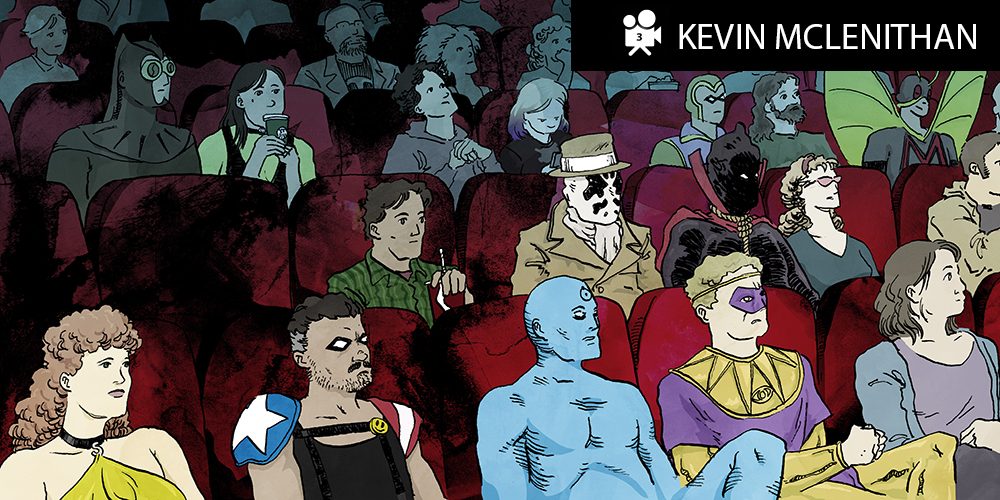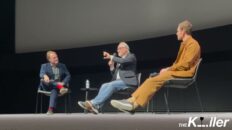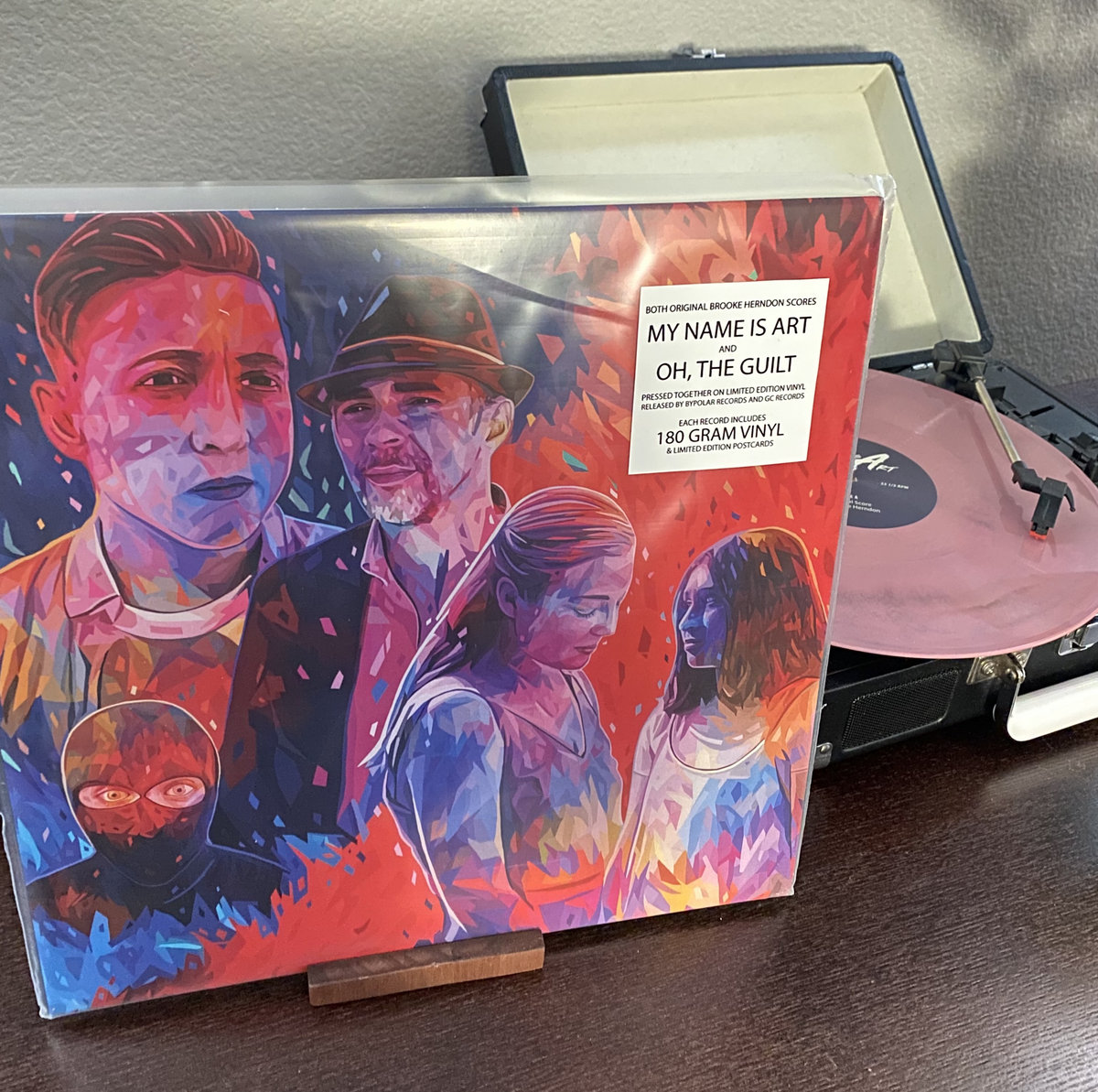Illustration by Seth T. Hahne
Continuing our Who Watches the Watchmen? series, I got to sit down with Kevin McLenithan, the co-host of the Seeing and Believing podcast. Although you’ll rarely find him in print, there are now 160 episodes of the podcast where he and co-host Wade Bearden discuss film, television, and pop culture. They’ve recently expanded their platform reach and you can now find them on YouTube, Soundcloud, and Spotify.RUD: Thank you for letting us ask you a few questions. Can you tell us a little about your background in film criticism? What made you interested in pursuing it?
McLenithan: I came late to film criticism, I guess. I didn’t really get super interested in film until after college. I had an old blog and every now and then I’d write about movies I had seen. Those entries were kinda snarky and about things I thought were amusing. Or else they were related to something like the Lord of the Rings movies and writing from the perspective of whether they served me as a fan.
But seriously looking at a film, analyzing it, and thinking deeply about what a filmmaker’s aims might have been and whether they were successful with those aims—maybe being a little more adventurous in the things I was trying to do—I didn’t get into that until after college when I saw Steven Spielberg’s Munich. I don’t know what it was about that movie, but I saw it and it was like a switch got flipped in my brain. I realized it was almost like I had spent most of my life looking at film through a keyhole and only thinking about it in a certain way. And for whatever reason seeing that movie was like the door had opened and now I could see, “Oh there is so much more to this if I want to explore it!” So I got a Netflix subscription and started watching all the films that I could.
RUD: What was your first professional work as a critic?
McLenithan: For a really long time I wasn’t writing a whole lot of film criticism. I had a little personal blog and every now and then I would write a short piece. Or I would write up my top 10 of a particular year. But it wasn’t all that frequent. I would just do it whenever I felt like sitting down and doing the work to write.
I think the first paid gig I had was for a festival. It was the Chicago International Film Festival. Back in the late 2000s they would build a program book with short pieces on each film in their slate for that year. They would actually solicit people on Craigslist. That’s how I heard about it. There was this posting on Craigslist that they were looking for people who were interested in watching a screener and writing up a couple blurbs. Those would go in this glossy program book that you could purchase once the festival began. Those were for people who really wanted to get a lot more information about the films they were seeing since a lot of these films weren’t necessarily ever going to be screened in the United States ever again.
And that was the first time I ever received any compensation for some writing I did. I was writing about films for a specific audience and had and editor and everything and working on tight schedules. The turnaround time on these was short and they needed to get the content polished and get that all turned around very quickly. So I was having deadlines and seeing movies I hadn’t even heard about or knew anything about and then trying to shape my thoughts into a coherent piece. And that was challenging. I did that for a couple years. It was a really good experience. Not only because I saw a lot of movies that I normally wouldn’t have, but also because it showed me the ropes. Of just sitting down and watching a film and shaping what I thought about it.
RUD: Now, you host the Seeing and Believing podcast with Wade Bearden. And you’re now on episode 160 of that. How did that come about?
McLenithan: I guess the first time I was formally a staff writer was with Christ and Pop Culture. I had written some film reviews for them and they decided they wanted to start up this podcast network and were looking for people to do a film podcast. They approached Wade Bearden, my co-host, to set that up. And they let him take it and do whatever he wanted with it. He decided to bring me in on that.
I think he and I have complimentary approaches to film. It’s a lot easier to do a podcast like ours when you have another person to bounce your ideas off. It’s not just you trying to muscle through the early days when you a have a really small listener base. That was about three years ago—a little over three years now—and we just decided to jump in and see where it took us.
I think our first episode was about what our aim was for film criticism. What is the purpose of Christian film criticism? Specifically, because that’s actually a question that a lot of Christians—at least in the sub culture that we’re speaking to—that’s a question that needs an answer. People ask, “Why do I need to engage with movies at all? Shouldn’t we just be focusing on specifically Christian things? Why does pop culture and movies, books, fine art—why do those things matter?” So our first episode was trying to answer that question for ourselves. From there we tried to put out an episode every week reviewing a couple of movies or television shows. We modelled ourselves off the Filmspotting podcast. It was really nice to have that as a model for us, or an example to follow, and adapt it as needed for our own purposes.
RUD: You touched on this a bit, but what do you hope the audience takes away from listening to Seeing and Believing?
McLenithan: Speaking for myself, the thing that I want listeners to have when they listen to an episode of ours—or maybe watch a movie on our recommendation—is to have a similar experience to the one I had when I saw Munich. To have an experience where they realize, “Oh, I don’t have to watch movies the way that I’ve always watched them. There’s a whole world out there of films and ways of thinking about film that maybe hadn’t occurred to me. And I can enter that world as well.” And I kinda see the Seeing and Believing podcast as inviting Christians into that world. Drawing them, making them ask certain questions about their moviegoing that maybe has never been asked of them before.
I think if we can draw people into that frame of mind when they go see movies, I feel really good about that. If somebody tweets me or lets me know that they saw a movie they would have never seen otherwise because of Seeing and Believing, that makes me really happy. And that makes me feel as if at least part of our mission is being accomplished. That we’re not just telling people what we think about movies, but also encouraging them to form their own conclusions and decide what they think about movies. But the important thing is inviting them into that conversation. Once you can get them into that conversation everything follows from there.
RUD: Who has been your favorite guest on the podcast?
McLenithan: I really enjoyed talking to David Lowery. He had just released A Ghost Story back in 2017 and I thought that was a really strong film. One of those films that gets you into a headspace that I think is pretty rare in mainstream filmmaking where there’s lots of mystery and it’s not necessarily—the answers are not all given to you. It lets you sit with the mystery for a while and think about it.
So I was really excited to interview Lowery about it. And he just proved to be—it’s a cliché thing to say about an interview subject, but Lowery was such a thoughtful, laid back person to talk to about his film. He was willing to give his impression of what he thought the film was about. But in interviewing him, he also just seemed to enjoy the experience of talking to someone else who had seen it and hearing what they got out of it as well. He was not the sort of filmmaker that was possessive of his art. He was really happy to have made it and shared it with other people and then see what they thought of it.
RUD: Who would you like to interview on your podcast?
McLenithan: If the language barrier could somehow be surmounted, I would really like to interview Hirokazu Koreeda. I admire his work a lot and there’s just this deeply felt humanity about the way he sees his characters. He seems like such a warm person from my impression of the films he makes.
RUD: I’m not familiar with his work, which of his films would you suggest seeing?
McLenithan: His most well-known film is probably Still Walking which is the only film of his that is currently in the Criterion Collection. In 2016 he made a film called After the Storm which was quite fine. And other well-known ones that he did were Our Little Sister and Nobody Knows. He works a lot. The problem is his films don’t get very wide distribution. That’s a shame. They tend to be family dramas. They tend to be, not sentimental, but there’s not a whole lot of grand conflict. He’s very similar to Ozu in that way. So maybe distributors don’t think they’re particularly marketable. Some of his films are hard to find because the DVDs are out of print or they never got released stateside in the first place. But if you can track his stuff down it’s worth it.
RUD: Going back to your podcast, do you feel podcasting is better or worse than written reviews? Or just different? And why?
McLenithan: I think it’s telling that so many critics—at least a lot of the ones I’ve talked to—one of the things that really got them interested in criticism in the first place was Siskel and Ebert’s television show. The idea of sitting down with another person and just talking back and forth about a movie. That’s really attractive in a way that writing a review isn’t. You’re not in a vacuum because you’re responding to other voices in a conversation.
The act of writing a review is a solitary one. And the act of developing your ideas starts with just you and then maybe with an editor later on. But it’s primarily a self-focused thing. The nice thing about podcasting—or at least podcasting with another critic—is you’re constantly in dialog with someone. And you shape your thoughts partly in response to that other person’s viewpoint. It helps me not get too hermetically sealed in my own critical perspective. I’m constantly talking to Wade and that reminds me that there are other ways of seeing this movie as I’m shaping my thoughts about it.
As far as writing goes, I’m still—I’m a terrible writer in a lot of ways. By which I mean I’m such a perfectionist and I write so slowly that it’s often very difficult for me. I kill myself over every review because I want to make sure that I’m saying things exactly the way I want to say them and do justice to what I’ve seen. So it can often be a very strenuous process for me. I enjoy it, but it’s a lot easier for me to podcast because it’s more conversational and you don’t have to get everything perfect the first time. The important thing is the conversation and the development of your opinion. And that is what I think is most attractive to me about film criticism: the development of thought, the slow arrival at what you think and why. And I think doing that in podcast form is an interesting path towards that destination that I don’t always get from writing.
RUD: You obviously come from a Christian viewpoint, but I’m curious if you think films can be a redemptive force? Do you think stories have the power to change the world?
McLenithan: I don’t know how much I buy into the argument that art changes the world. But I do think that art can change people and by changing people the world can be shifted a little bit. One thing that I think is so important about stories and art in general is that it can make the world around you and your own life new and strange to you in productive ways. When you watch a movie you that you don’t know why it was made, or you encounter a story written from a perspective you never conceived of before, that helps you realize—or reminds you—that the world is bigger than yourself. It takes you out of yourself. It takes you out of your own perspective just for a while. And I think that’s a really productive thing for all people because it’s really easy to get locked inside yourself.
As a Christian I believe that human beings are fallen. There’s something that’s broken or bent in the world—in humankind—that happened a long time ago. And art is one way of coming to terms with that. To not be so shrunken and bent out of shape and focused on ourselves, but to turn our focus outward. And I think art draws us into that mindset. And through that, maybe the world can be changed. But the world changes through the changing of yourself, I guess. I constantly see a film or read something, and I think, “Huh, I never would have thought of that.” I would have continued in my life having this really limited, narrow perspective if it hadn’t been for encountering this bit of writing or this film. It’s kind of low key miraculous. I think God can work through that stuff and maybe why that’s why I want to devout my life to help people encounter God’s work in areas they may not have considered.
RUD: Is there one film, not necessarily your favorite, that you are always excited to show someone the first time?
McLenithan: I don’t know that I have one film that I’m always wanting to show people. One thing I enjoy is figuring out a person’s taste and then finding a movie that I like that I think they will like too. I don’t think there’s a single answer to this question. I will say that I always love it when I can share Kurosawa’s Ran with somebody for the very first time. I just love to sit someone down in front of that and have them watch the whole thing and then at the end and turn to them and ask them what they thought. There’s something about Kurosawa’s films where you come out the other side of it and you have this kind of, “Woah!” reaction to it.
RUD: You mentioned Ebert before, and I was just discussing him on Twitter. Missing his voice. But I noted there are a lot of amazing film critics working today. Maybe not with his household recognition, but there’s a bunch of great work being done if you sift through all the clickbait. Are there any current film critics you make time to keep on top of? And what do you think makes them worth reading?
McLenithan: The first person that comes to mind is Lauren Wilford of Bright Wall/Dark Room. I don’t think she’s been writing as much as she used to lately. But if she has a new essay out I make it a point to read it. She’s got a very acute way of viewing a movie and writing about it that I find refreshing. She had an essay a while ago on Robert Eggers The VVitch that I think is maybe one of the finest, hope filled essays on a horror film that I have ever read. I think it gets how entering into a filmmaker’s specific perspective and giving yourself over to a film’s world is integral to engaging with that work on the level that you need to be. And The VVitch was just such a perfect film to write that essay about.
I also really like Scott Tobias. I think his reviews are also very acute and enjoyable to read.
And Josh Larsen is a fine writer as well. One thing I enjoy about his perspective is that there’s this little bit of quirkiness in the stuff he writes. He’ll just absolutely love a film where I go, “Really? That film? Why?” I enjoy being taken on rides where a critic makes a left turn that I totally wouldn’t have expected, but over the course of reading the work, I’m like, “You know what, that makes sense, even if I don’t agree, that makes sense.” And that’s a fun experience to have with any critic.







